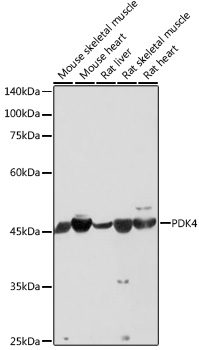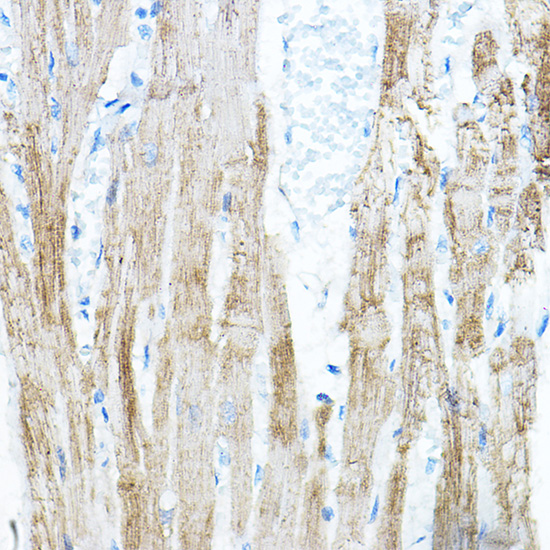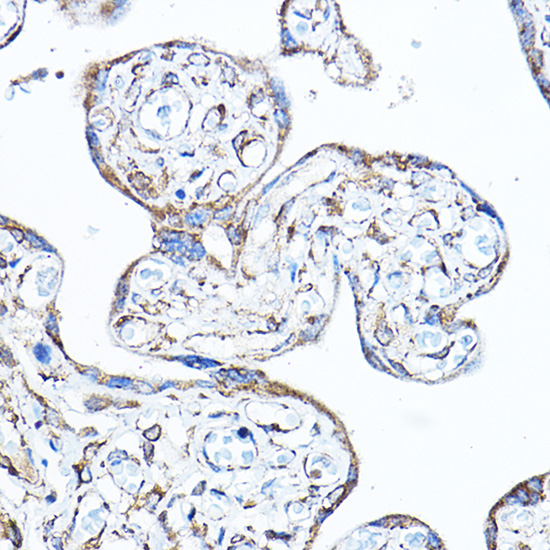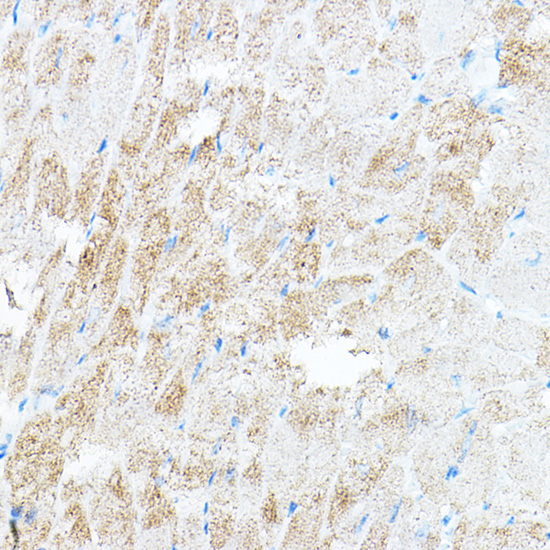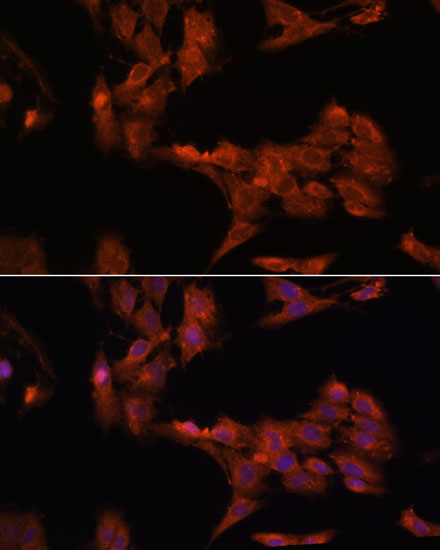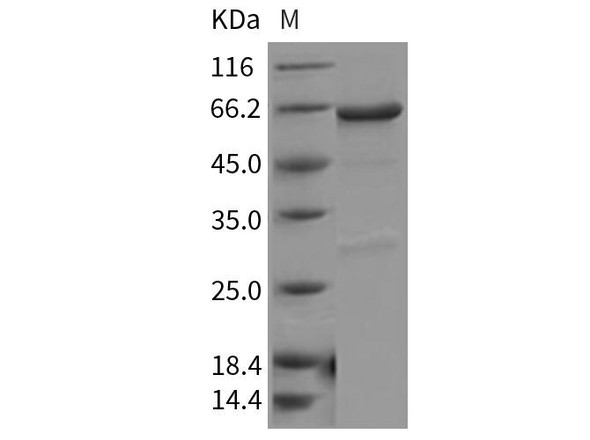Metabolism Antibodies 1
Anti-PDK4 Antibody (CAB13337)
- SKU:
- CAB13337
- Product Type:
- Antibody
- Reactivity:
- Human
- Reactivity:
- Mouse
- Reactivity:
- Rat
- Host Species:
- Rabbit
- Isotype:
- IgG
- Antibody Type:
- Polyclonal Antibody
- Research Area:
- Metabolism
Description
| Antibody Name: | Anti-PDK4 Antibody |
| Antibody SKU: | CAB13337 |
| Antibody Size: | 20uL, 50uL, 100uL |
| Application: | WB IHC IF |
| Reactivity: | Human, Mouse, Rat |
| Host Species: | Rabbit |
| Immunogen: | Recombinant fusion protein containing a sequence corresponding to amino acids 102-411 of human PDK4 (NP_002603.1). |
| Application: | WB IHC IF |
| Recommended Dilution: | WB 1:500 - 1:2000 IHC 1:50 - 1:200 IF 1:50 - 1:200 |
| Reactivity: | Human, Mouse, Rat |
| Positive Samples: | Mouse skeletal muscle, Mouse heart, Rat liver, Rat skeletal muscle, Rat heart |
| Immunogen: | Recombinant fusion protein containing a sequence corresponding to amino acids 102-411 of human PDK4 (NP_002603.1). |
| Purification Method: | Affinity purification |
| Storage Buffer: | Store at -20'C. Avoid freeze / thaw cycles. Buffer: PBS with 0.02% sodium azide, 50% glycerol, pH7.3. |
| Isotype: | IgG |
| Sequence: | FHEK SPDD QKAL SDFV DTLI KVRN RHHN VVPT MAQG IIEY KDAC TVDP VTNQ NLQY FLDR FYMN RIST RMLM NQHI LIFS DSQT GNPS HIGS IDPN CDVV AVVQ DAFE CSRM LCDQ YYLS SPEL KLTQ VNGK FPDQ PIHI VYVP SHLH HMLF ELFK NAMR ATVE HQEN QPSL TPIE VIVV LGKE DLTI KISD RGGG VPLR IIDR LFSY TYST APTP VMDN SRNA PLAG FGYG LPIS RLYA KYFQ GDLN LYSL SGYG TDAI IYLK ALSS ESIE KLPV FNKS AFKH YQMS SEAD DWCI PSRE PKNL AKEV AM |
| Gene ID: | 5166 |
| Uniprot: | Q16654 |
| Cellular Location: | Mitochondrion matrix |
| Calculated MW: | 46kDa |
| Observed MW: | 46KDa |
| Synonyms: | PDK4 |
| Background: | This gene is a member of the PDK/BCKDK protein kinase family and encodes a mitochondrial protein with a histidine kinase domain. This protein is located in the matrix of the mitrochondria and inhibits the pyruvate dehydrogenase complex by phosphorylating one of its subunits, thereby contributing to the regulation of glucose metabolism. Expression of this gene is regulated by glucocorticoids, retinoic acid and insulin. |
| UniProt Protein Function: | PDHK4: an ubiquitously expressed, atypical protein kinase associated with the mitochondrial matrix. The PDHKs play crucial roles in switching metabolic flux from oxidative phosphorylation towards glycolysis. PDHK4 is abundant in heart, skeletal muscle, kidney, and pancreatic islets. Contains a HATPase_c catalytic domain, found in several ATP-binding proteins including protein histidine kinases (PHKs), PHDKs, DNA gyrase B, topoisomerases, heat shock proteins, and DNA mismatch repair proteins. PDHK regulates glucose oxidation through inhibitory phosphorylation of the E1 alpha subunit of the mitochondrial pyruvate dehydrogenase complex (PDHC) at any one of 3 inhibitory serine residues. Inhibitory sites 1, 2, and 3 correspond to S293, S300, and S232 in human PDHA1, respectively. Four PDHK isoenzymes have been described, each with different site specificity: all four phosphorylate sites 1 and 2 but at different rates; for site 1 PDHK2 >PDHK4 >PDHK1 >PDHK3; for site 2, PDHK3> PDHK4 > PDHK2 > PDHK1. Only PDHK1 phosphorylates site 3. PDHKs are recruited to the PDHC by binding to a lipoyl group covalently attached to the inner lipoyl domain of the E2 component. PDHA1 deficiency is the most common enzyme defect in patients with primary lactic acidosis. Suppression of PDH by PDHK inhibits the conversion of pyruvate to acetyl-CoA, attenuates mitochondrial respiration, and may contribute to the increased lactate production observed in many tumors. The PDH pathway is repressed in a majority of non-small cell lung carcinomas. Inhibited by AZD7545, dichloroacetate (DCA), and radicicol. Radicicol inhibits kinase activity by binding directly to the ATP-binding pocket of PDHK, similar to HSP90 from the same ATPase/kinase superfamily. |
| UniProt Protein Details: | Protein type:Kinase, protein; Mitochondrial; EC 2.7.11.2; Protein kinase, atypical; ATYPICAL group; PDHK family Chromosomal Location of Human Ortholog: 7q21.3 Cellular Component: mitochondrion; mitochondrial matrix; mitochondrial inner membrane Molecular Function:pyruvate dehydrogenase (acetyl-transferring) kinase activity; ATP binding; protein kinase activity Biological Process: response to starvation; cellular metabolic process; regulation of bone resorption; regulation of fatty acid biosynthetic process; regulation of fatty acid oxidation; insulin receptor signaling pathway; regulation of pH; glucose metabolic process; regulation of acetyl-CoA biosynthetic process from pyruvate; pyruvate metabolic process; cellular response to starvation; glucose homeostasis; protein amino acid phosphorylation |
| NCBI Summary: | This gene is a member of the PDK/BCKDK protein kinase family and encodes a mitochondrial protein with a histidine kinase domain. This protein is located in the matrix of the mitrochondria and inhibits the pyruvate dehydrogenase complex by phosphorylating one of its subunits, thereby contributing to the regulation of glucose metabolism. Expression of this gene is regulated by glucocorticoids, retinoic acid and insulin. [provided by RefSeq, Jul 2008] |
| UniProt Code: | Q16654 |
| NCBI GenInfo Identifier: | 3183120 |
| NCBI Gene ID: | 5166 |
| NCBI Accession: | Q16654.1 |
| UniProt Related Accession: | Q16654 |
| Molecular Weight: | 411 |
| NCBI Full Name: | [Pyruvate dehydrogenase (acetyl-transferring)] kinase isozyme 4, mitochondrial |
| NCBI Synonym Full Names: | pyruvate dehydrogenase kinase, isozyme 4 |
| NCBI Official Symbol: | PDK4 |
| NCBI Protein Information: | pyruvate dehydrogenase kinase, isozyme 4; pyruvate dehydrogenase kinase, isoenzyme 4; pyruvate dehydrogenase, lipoamide, kinase isozyme 4, mitochondrial; [Pyruvate dehydrogenase [lipoamide]] kinase isozyme 4, mitochondrial; [Pyruvate dehydrogenase (acetyl-transferring)] kinase isozyme 4, mitochondrial |
| UniProt Protein Name: | [Pyruvate dehydrogenase (acetyl-transferring)] kinase isozyme 4, mitochondrial |
| UniProt Synonym Protein Names: | Pyruvate dehydrogenase kinase isoform 4 |
| UniProt Gene Name: | PDK4 |
| UniProt Entry Name: | PDK4_HUMAN |


